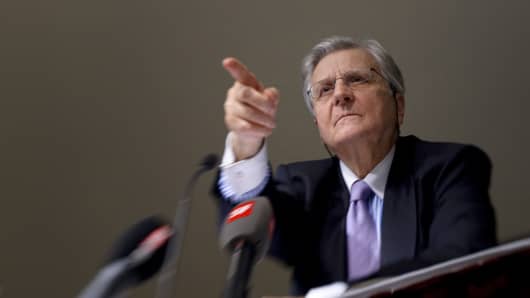The euro zone’s debt crisis is just the center of an “adjustment” which is affecting all advanced economies, former European Central Bank (ECB) President Jean-Claude Trichet told CNBC.
“The Europeans have a special responsibility because we are the epicenter of the worst crisis since World War II. And that, of course, calls for highly responsible decisions,” he said.
All the advanced economies are undergoing their first major adjustment since the Second World War, according to Trichet.
“When you look with historical credit at what has happened since 2007, it was the start of the adjustment of the advanced economy. We have to understand-- it's our turn. We cannot ask the rest of the world to finance us eternally if we spend more than we earn. As simple as that,” he said.
“We paid quite a high price for a dominant vision, which was too much benign neglect before the start of the crisis.”
He also highlighted several “naïve beliefs” from policymakers in the pre-crisis days, including the belief that the developed world’s financial and economic systems were “stable and resilient” because they absorbed the dotcom bubble bursting in the early years of the twenty-first century.
Central banks across the board in the advanced economies – including the Bank of Japan and the U.S. Federal Reserve, are engaged in “non-standard measures” to protect their economies, he pointed out.
The Fed announced its third round of quantitative easing on Thursday, which was followed by a rally in markets around the world, while the ECB’s widely-anticipated bond-buying program, dubbed “Outright Monetary Transactions”, which will buy up bonds of struggling countries if they threaten to rise to levels which make borrowing costs unsustainable, was announced last week. (Read More: Will Post-Fed Market Rally Last?)
“What has been done in the case of Europe, is commensurate to the gravity of the situation. But it has to be checked,” Trichet said.
Governments now have to use the time provided by these measures to work hard to restore their economies to health, according to Trichet, who warned that there “is very hard work to do in all advanced economies.
Trichet was confident that history would judge him well for his eight-year stewardship of the ECB, which finished with his handover to Mario Draghi last year.
He also called for an end of the belief that some financial institutions are “too big to fail,” which led to many of the banking bailouts that increased governments’ debt burdens during the credit crisis.
Quick delivery by governments and conditions being placed on the new bond-buying program are the key factors for the euro zone right now, Trichet argued.
The man who steered the euro zone through the early years of the crisis, called for “speedy and expeditious delivery” by governments.
He said of the bond-buying program introduced by his successor: “It has to meet the requirements and conditions, including to be commensurate to the destruction of pocket we have to cope with. It has to be accompanied with appropriate messages for the private and public sector.”
“I think it is extremely important not only for the euro but the rest of the world,” Trichet said.
“It depends on the governments individually to adjust and collectively through the ESM (European Stability Mechanism) to deliver. In the past, they did not always rapidly and actively. Governments are not necessarily delivering what they promised.” (Read More: Will ESM Be Big Enough?)
The French economist also argued that it was not just the struggling peripheral economies which need to deliver, but also the stronger economies which have to prop them up. Germany , the euro zone’s biggest economy, was the only member of the ECB to vote against the plan for OMTs last week.
“We have those who have problems, and they are clearly identified. But there are those who are part of the college who have to understand that their prosperity and stability is associated with the stability of the whole,” Trichet said.
He warned that Greece exiting the euro would be the “worst possible decision for the Greeks themselves… and also of the rest of Europe and the entire world.” (Read More: Greece Denies Report of Third Bailout)
“Of course history is not written and it depends on the decision of the various countries concerned,” he added.
Reported by Michelle Caruso-Cabrera, CNBC Chief International Correspondent. Written by Catherine Boyle, CNBC. Twitter: @catboyle01.


